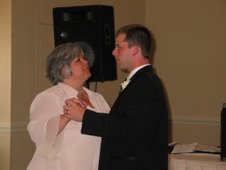I must say that after reading Elizabeth Robert Browning and never having read Robert Browning before, I was expecting their work to be similar. From my reading, nothing could be farther from the truth. I certainly was prepared from the background information provided on Browning for a different type of work; but even still I was surprised as I read Porphyria's Lover. Browning sets the scene saying,
"The rain set early in to-night,
The sullen wind was soon awake,
It tore the elm-tops down for spite,
And did its worse to vex the lake:"
This description immediately gave me a sense of foreboding. My sense of dread was lightened reading the description of Porphyria, seemingly a beautiful woman whom the speaker has pursued. It seems that finally she has come to return his love. He says
"Happy and proud; at last I knew
Porphyria worshipped me; surprise
Made my heart swell, and still it grew
While I debated what to do.
That moment she was mine, mine, fair, "
The speaker says that her statement of love makes him happy, yet the line "While I debated what to do" returned a little of my uneasiness, I was not at all prepared for what came next. Browning does a brilliant job of keeping the reader off guard...never knowing from one minute to the next what to expect.
The last line of the poem "And yet God has not said a word!" left me questioning what the speaker was expecting to hear from God. Was he expected to be stricken down for his crime of murder? To be honest, I was never completely sure that he had killed Porphyria...what was his motivation?
The Bishop Orders His Tomb at Saint Praxed's Church, was another of Brownings poems that I found interesting. I wondered if Browning held the church in disdain, because he surely portrayed this Bishop as a worldly rather than a holy man. I found this particularly of interest, because I would expect that we (people in general) tend be more reflective on our life in the face of death, than concerned with the physical tributes to us such as our tombs, headstones, etc. However, I suppose this was reflective of the time.
I especially shocked when the Bishop appeared to be describing the location of a lump of lapis stone which he had buried. His descriptions of the stone as
"Big as a Jew's head cut off at the nape,
Blue as a vein o'er the Madonna's breast . . ."
seem especially vile coming from a man of his position. He seems to go even farther in his pompousness (not sure that is a word...) when he compares the lapis with the globe as if to say that he loves the stone as God loves the earth
"So, let the blue lump poise between my knees,
Like God the Father's globe on both his hands"
At the end of this poem, I was left feeling that I had read the somewhat pathetic ramblings of an old man...a man who facing death is somewhat bitter and extremely petty having never come to realize that joys that life is suppose to hold.
Sunday, June 10, 2007
Subscribe to:
Post Comments (Atom)

2 comments:
Wanda,
Very good exploration and commentary on these two dramatic monologues. Good use of textual examples to set up your analysis. As usual, great work!
You know I am such a big poetry buff, and the Brownings are probably two of my favorites. Of course, I enjoy them for very different reasons, but they are both wonderful poets in their own ways. Elizabeth is so warm and loving. She wrote some of the most beautiful love poetry I have ever read, yet Robert is so dramatic and almost macabre. "Porphyria's Lover" is so intriguing to me, because I am also left with so many questions after reading it. I've read it over and over trying to figure out exactly what's going on, but each time something new comes up, and I'm back to square one, but I suppose that's why people still read it after 100 years.
Post a Comment